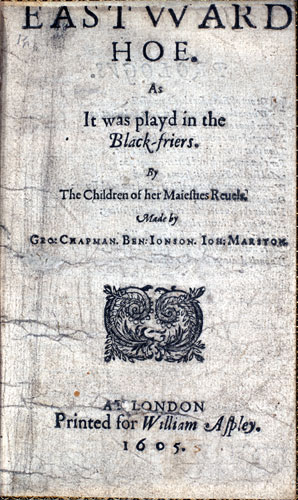
William Shakespeare was an English playwright, poet and actor. He is widely regarded as the greatest writer in the English language and the world's pre-eminent dramatist. He is often called England's national poet and the "Bard of Avon". His extant works, including collaborations, consist of some 39 plays, 154 sonnets, three long narrative poems, and a few other verses, some of uncertain authorship. His plays have been translated into every major living language and are performed more often than those of any other playwright. Shakespeare remains arguably the most influential writer in the English language, and his works continue to be studied and reinterpreted.

The earliest texts of William Shakespeare's works were published during the 16th and 17th centuries in quarto or folio format. Folios are large, tall volumes; quartos are smaller, roughly half the size. The publications of the latter are usually abbreviated to Q1, Q2, etc., where the letter stands for "quarto" and the number for the first, second, or third edition published.

Benjamin Jonson was an English playwright and poet. Jonson's artistry exerted a lasting influence upon English poetry and stage comedy. He popularised the comedy of humours; he is best known for the satirical plays Every Man in His Humour (1598), Volpone, or The Fox, The Alchemist (1610) and Bartholomew Fair (1614) and for his lyric and epigrammatic poetry. "He is generally regarded as the second most important English dramatist, after William Shakespeare, during the reign of James I."
This article contains information about the literary events and publications of 1604.

This article presents a possible chronological listing of the composition of the plays of William Shakespeare.

John Marston was an English playwright, poet and satirist during the late Elizabethan and early Jacobean periods. His career as a writer lasted only a decade. His work is remembered for its energetic and often obscure style, its contributions to the development of a distinctively Jacobean style in poetry, and its idiosyncratic vocabulary.
The King's Men was the acting company to which William Shakespeare (1564–1616) belonged for most of his career. Formerly known as the Lord Chamberlain's Men during the reign of Queen Elizabeth I, they became the King's Men in 1603 when King James I ascended the throne and became the company's patron.
Henry Condell was a British actor in the King's Men, the playing company for which William Shakespeare wrote. With John Heminges, he was instrumental in preparing and editing the First Folio, the collected plays of Shakespeare, published in 1623.
The Lord Chamberlain's Men was a company of actors, or a "playing company", for which William Shakespeare wrote during most of his career. Richard Burbage played most of the lead roles, including Hamlet, Othello, King Lear, and Macbeth. Formed at the end of a period of flux in the theatrical world of London, it had become, by 1603, one of the two leading companies of the city and was subsequently patronized by James I.

Eastward Hoe or Eastward Ho! is an early Jacobean-era stage play written by George Chapman, Ben Jonson and John Marston. The play was first performed at the Blackfriars Theatre by a company of boy actors known as the Children of the Queen's Revels in early August 1605, and it was printed in September the same year.

Every Man out of His Humour is a satirical comedy play written by English playwright Ben Jonson, acted in 1599 by the Lord Chamberlain's Men.

John Lowin was an English actor.

Thomas Thorpe was an English publisher, most famous for publishing Shakespeare's sonnets and several works by Christopher Marlowe and Ben Jonson. His publication of the sonnets has long been controversial. Nineteenth-century critics thought that he might have published the poems without Shakespeare's consent; Sidney Lee called him "predatory and irresponsible." Conversely, modern scholars Wells and Taylor assert their verdict that "Thorpe was a reputable publisher, and there is nothing intrinsically irregular about his publication."
Alexander Cooke was an actor in the King's Men and the Lord Chamberlain's Men, the acting companies of William Shakespeare, John Heminges and Richard Burbage.
Catiline His Conspiracy is a Jacobean tragedy written by Ben Jonson. It is one of the two Roman tragedies that Jonson hoped would cement his dramatic achievement and reputation, the other being Sejanus His Fall (1603).
Valentine Simmes was an Elizabethan era and Jacobean era printer; he did business in London, "on Adling Hill near Bainard's Castle at the sign of the White Swan." Simmes has a reputation as one of the better printers of his generation, and was responsible for several quartos of Shakespeare's plays. [See: Early texts of Shakespeare's works.]

Westward Ho is an early Jacobean-era stage play, a satire and city comedy by Thomas Dekker and John Webster that was first performed circa 1604. It had an unusual impact in that it inspired Ben Jonson, George Chapman and John Marston to respond to it by writing Eastward Ho, the famously controversial 1605 play that landed Jonson and Chapman in jail.
William Aspley was a London publisher of the Elizabethan, Jacobean, and Caroline eras. He was a member of the publishing syndicates that issued the First Folio and Second Folio collections of Shakespeare's plays, in 1623 and 1632.
George Eld was a London printer of the Jacobean era, who produced important works of English Renaissance drama and literature, including key texts by William Shakespeare, Ben Jonson, Christopher Marlowe, and Thomas Middleton.

The spelling of William Shakespeare's name has varied over time. It was not consistently spelled any single way during his lifetime, in manuscript or in printed form. After his death the name was spelled variously by editors of his work, and the spelling was not fixed until well into the 20th century.











